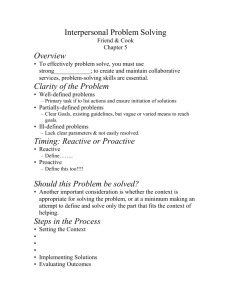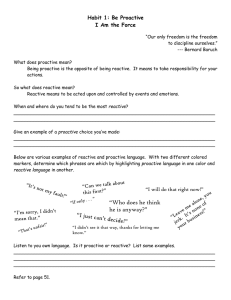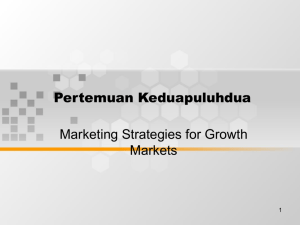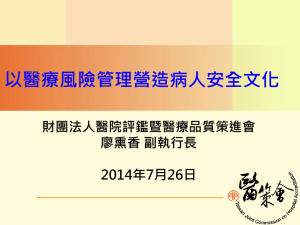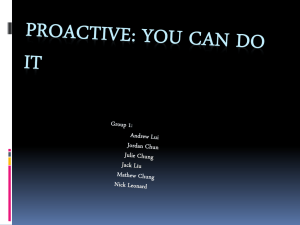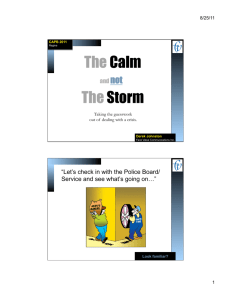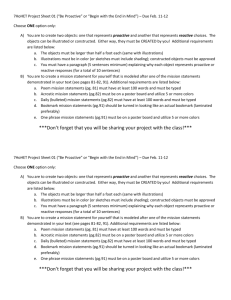Self Audits / Proactive Compliance Best Practices
advertisement
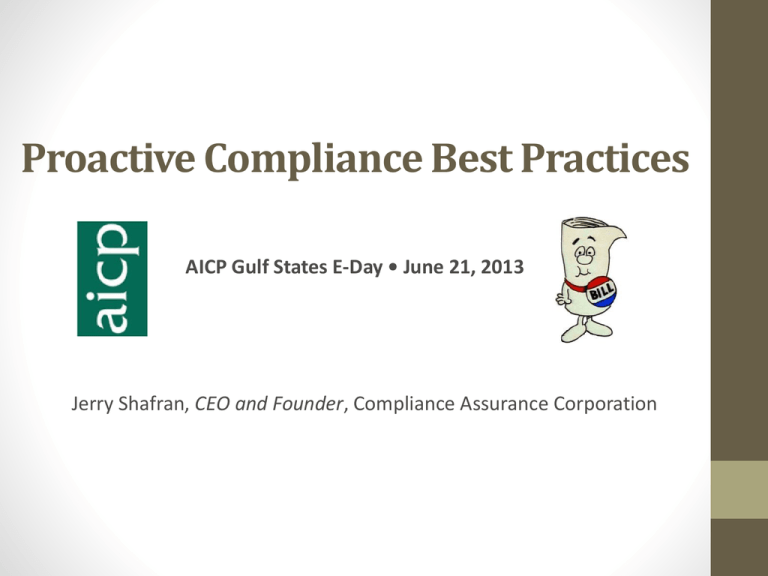
Proactive Compliance Best Practices AICP Gulf States E-Day • June 21, 2013 Jerry Shafran, CEO and Founder, Compliance Assurance Corporation A Proactive Reactive Approach ApproachtotoRegulatory RegulatoryCompliance Compliance What does a “proactive” “reactive” compliance complianceprogram programlook like? like? look What are the benefits risks of reactive of proactive compliance? compliance? How Whatdo areI ensure the costs a proactive of reactive process? compliance? “If you don't know where you’re going, you'll end up someplace else.” - Yogi Berra, Baseball Legend, Great Philosopher “Someone’s sitting in the shade today because someone planted a tree a long time ago.” - Warren Buffet “That’s like leaping off a precipice and trying to knit yourself a parachute on the way down.” - Kelli Jae Baeli We need a plan! …Be aware of… …Comply with… …Demonstrate compliance… Manual or Technology Compliance Lifecycle Management: A Road Map I. Identify & Document Regulatory Changes II. Assess Relevance III. Translate Regulatory Changes into Business Requirements IV. Communicate V. Execute VI. Monitor & Validate VII. Report Who am I? Identify & Document Regulatory Changes Why it’s so important. Resources: Trade Websites, Software Solutions, Email Notifications Personnel: Intake Analysts, Paralegals, Attorneys, Compliance Staff Best Practices Audience Question: What imaginative ways do you use to look for Regulatory changes? Assess Relevance to Your Organization Why it’s so important. Criteria: Line of Business, Jurisdiction, Premiums Written, etc. Personnel: Compliance Staff, Paralegals, Attorneys & General Counsels Best Practices Trivia: How many regulatory changes take place in an average year? a) 1,000-2,000 b) 2,000-3,000 c) 3,000-4,000 d) 4,000+ Translate Regulatory Change into Business Requirements Corporate Why it’s so important. Battle Cry.. Heard Across Personnel & Resources: Compliance Staff, Business This Great Nation Unit Management, Attorneys, Software/Third Party Solutions You have to do more with less! Best Practices Could Compliance Drive more Value by Translating Incoming Regs. into Business Requirements? Communicate Why it’s so important. Personnel: Compliance Staff, Business Unit Management Tools: Email, Meetings, Policy Updates, Internal Network, Third Party Software Best Practices Audience Question: Can you discuss your firms perspective on Producer/TPA compliance liability? Execute Why it’s so important. Personnel: Business Unit Employees, NATP’s, Agents, Distribution Network, Compliance Staff Best Practices Monitor & Validate Why it’s so important. Personnel: Compliance Staff (Senior), Business Unit Management, Executive Management Tools: Software/Third Party Solution, Internal Monitoring Controls Best Practices Report Why it’s so important. Personnel: Compliance Staff (Senior), Business Unit Management, Executive Management Tools: Software/Third Party, Internal System Best Practices Compliance Lifecycle Management: A Road Map I. Identify & Document Regulatory Changes II. Assess Relevance III. Translate Regulatory Changes into Business Requirements IV. Communicate V. Execute VI. Monitor & Validate VII. Report Q&A Thank You! Jerry Shafran, CEO, Compliance Assurance Corporation Email: jshafran@complyfast.com Web: www.complyfast.com
